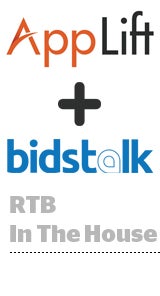 App marketing platform AppLift has made a move to strengthen its stack with the acquisition of Singapore-based mobile DSP Bidstalk.
App marketing platform AppLift has made a move to strengthen its stack with the acquisition of Singapore-based mobile DSP Bidstalk.
Terms of the deal, revealed Thursday, were not disclosed.
AppLift’s technology centers on user acquisition and lifetime value (LTV) optimization for its roughly 500 clients, among them Match.com, King, Zynga, Glu Mobile and Indian fashion portal Myntra, which shut down its website and went app-only earlier in May – but there was something missing.
“We started as a CPI network for games and we built a solid platform around LTV, but we never made the step into RTB,” said AppLift CEO Tim Koschella, who co-founded the company in 2012. “But now we’re seeing an inflection point around mobile performance and it feels like the right time to combine our tech stack with an RTB stack so we can help clients target their ads more precisely.”
AppLift spent roughly a year and a half shopping for the right mobile DSP, ultimately looking at about 50 different companies before settling on Bidstalk.
But Bidstalk isn’t your typical mobile DSP. Rather, it’s a behind-the-scenes white-label solution for ad nets, exchanges, agencies and publishers and it’s plugged into more than 50 mobile programmatic supply sources, including MoPub, Smaato, Google’s Ad Exchange, Rubicon, Flurry, Nexage, MediaMath, OpenX, Tapsense, Opera Mediaworks, Yahoo, Avocarrot, Adapt.TV, Appflood, Brightroll, SpotXchange, LiveRail and PubNative, with Fyber and several others on the way.
Bidstalk’s self-service technology has already been integrated into DataLift, Applift’s mobile user acquisition platform, which the company launched in January, giving Applift customers the ability to combine their bidding with their data management. Despite the integration, the two companies will continue to operate as separate entities.
Along with the Bidstalk acquisition, AppLift also said Thursday that DataLift, previously only available as a managed service, will be offered on a self-service basis, although Koschella expects that most clients will still prefer some sort of hybrid model.“In theory, people won’t need any interaction with an account manager,” he said. “But due to the complexities of the RTB ecosystem, we’re still there to handhold clients in case something goes wrong.”
AppLift is also looking to use Bidstalk, which has been largely focused on Southeast Asia until now, as a springboard into APAC, while at the same time helping Bidstalk get more business in Europe and North America. In addition to its main offices in Berlin and San Francisco, AppLift recently opened three new Asia Pacific outposts in Beijing, Tokyo and Delhi.
APAC is a crucial part of AppLift’s strategy going forward, and for good reason, said Koschella – smartphone penetration is through the roof.
According to Forrester, smartphone penetration is at around 85% in Singapore – higher than North America’s 71% – while Japan clocks in at 57%, China at 44%, Indonesia at 39%, the Philippines at 32% and India at just 23%.
“Most of the countries in APAC are either mobile-first or have transitioned to become more mobile – even more mature markets, like Japan,” Koschella said, noting the differential that still exists between mobile spend and mobile usage in many APAC countries,
“Then there are also all of these emerging ecosystems in Southeast Asia, places like Thailand, Malaysia, Vietnam, India and even Myanmar where adoption is still low, but the room to grow is tremendous,” he said. “And almost all of that digital growth will come from mobile, not desktop, because in these countries, the way they access the Internet is through a smartphone, not a PC.”
All of Bidstalk’s 43 mostly engineer, developer and data scientist employees will join the AppLift team, swelling the latter’s ranks to about 200. Also coming aboard are Bidstalk’s founder Vaibhav Gupta and CTO Guna Kakulapati, who worked on developing the technology behind both the Google Display Network and Amazon Web Services.
Founded in 2014, Bidstalk was bootstrapped with $500,000 in seed cash from founder Gupta. AppLift raised $20 million in Series A in 2013 led by Prime Ventures.















